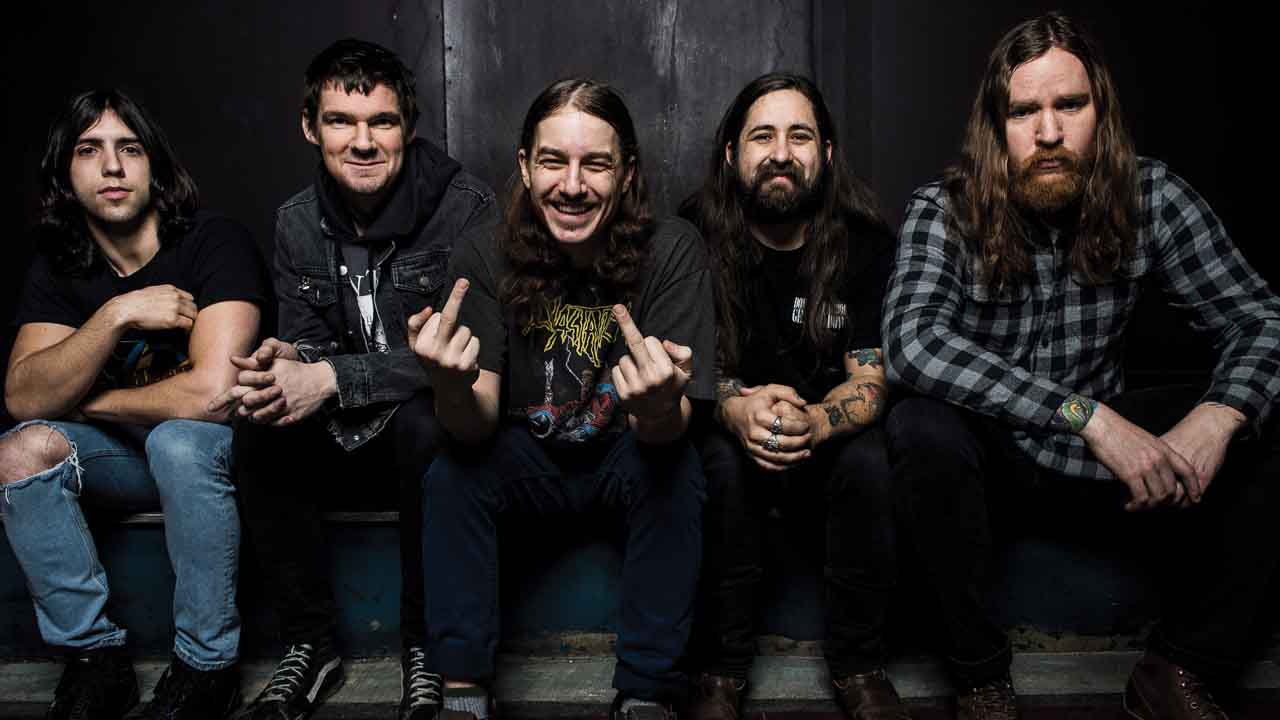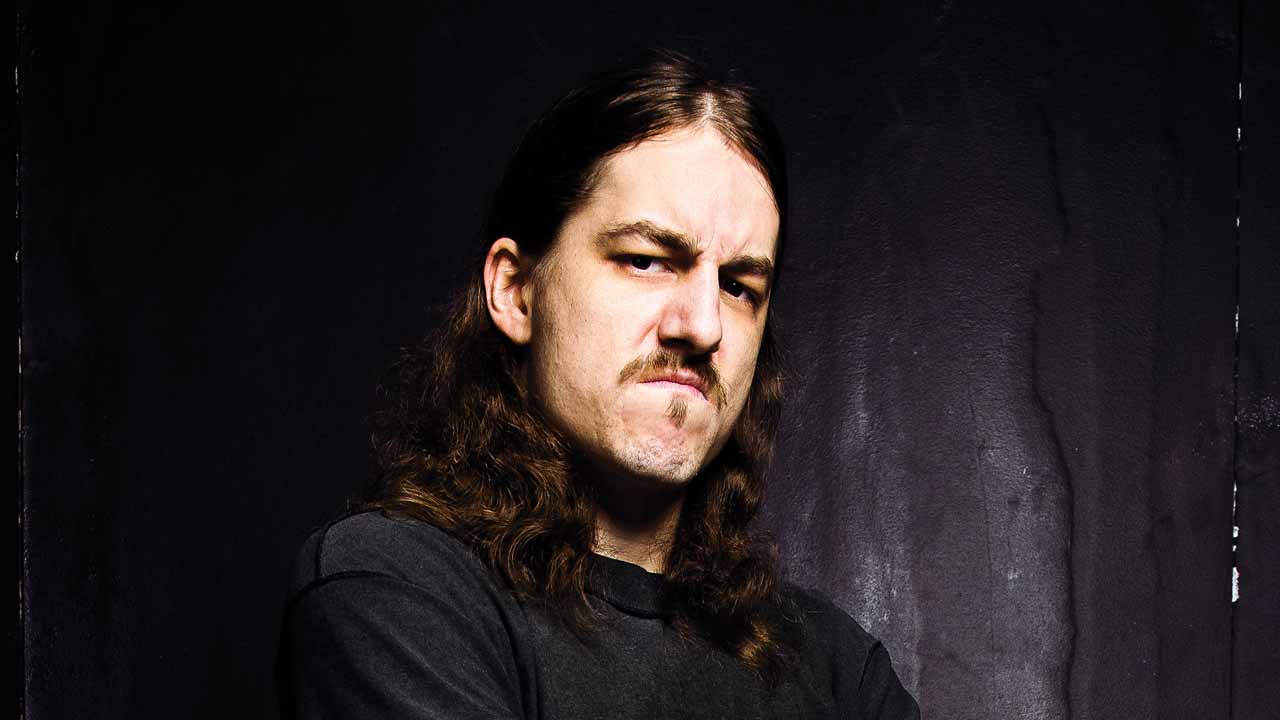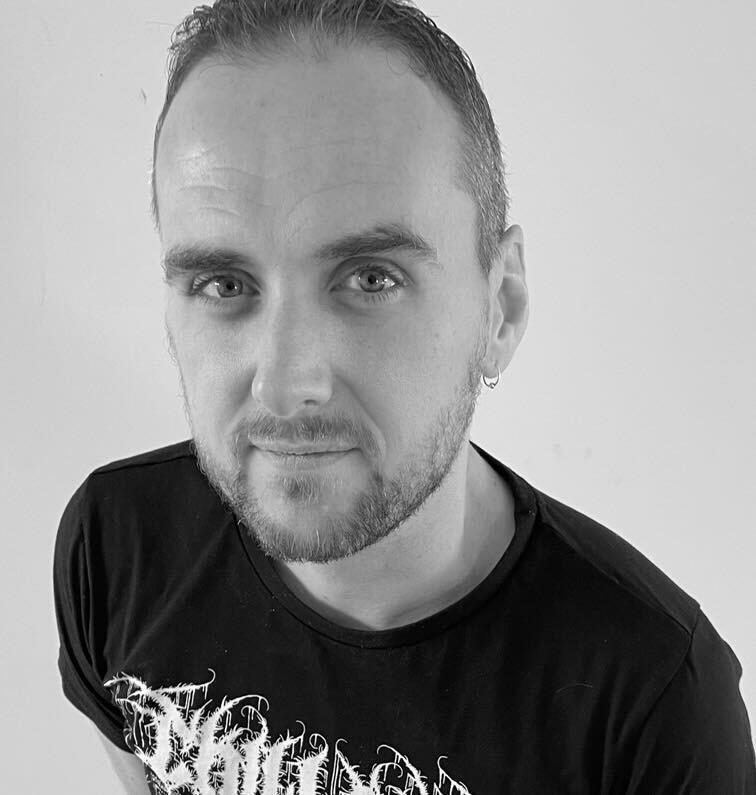When news broke in the late hours of August 25 that Riley Gale had passed away, you only needed a quick glance at ‘Metal Twitter’ to understand how beloved the Power Trip singer was in our world. Yes, there were plenty of tributes to how brilliant a frontman he was. His unmistakable, rasping bellow was the focal point around which Power Trip’s buzzsaw thrash attack could flow; his effortless command of a crowd made him a formidable presence onstage. But it was the tributes to the man, not the musician, that stood tallest that night. Almost immediately, personal anecdotes from friends, fans and peers began flooding social media – you couldn’t move for tales of Riley’s generosity, his empathy and his love for the scene that bore him.
Because Riley Gale was one of us. He represented everything that metal should aspire to be: fearless, uncompromising, sure, but also accepting, unprejudiced, open-minded and full-hearted. He refused to let his band be co-opted by arseholes - “If someone is wearing a Power Trip shirt, you can probably assume that that person isn’t some weird, racist, meathead piece of shit” he famously told Revolver – and he was unafraid to wear his beliefs on his sleeve. He wanted metal to be a safe space for everybody, and would always go out of his way to make that possible for those around him.
- The 50 best Metallica songs of all time
- 30 Essential thrash metal bands that aren't the big four
- Eternal devastation: the untold story of thrash metal’s other Big Four
- Dave Mustaine: the 50 greatest quotes
Growing up in the suburbs of Dallas, Texas, in an Irish Catholic household, Riley’s discovery of heavy music took a little while to properly get going – “my parents’ house wasn’t a musical home at all”, he’d tell Hammer. He was a “little shit” in school who’d “bump back against everything”, though he would later come to appreciate his education, which would eventually take him to a bachelor’s degree in technical writing – a course that taught him that “every word matters”.
It was music, though, that was his true calling. While he kept a soft spot for the Motown and old soul songs that’d sometimes get played on the radio, it was punk rock that ignited his interest, courtesy of a cousin who introduced him to the rosters of hallmark labels like Epitaph and Fat Wreck Chords. Soon, he began attending every rock gig in and around his hometown that he could possibly find. “When I was getting into music in the first couple of years of high school, I wanted to see everything,” he recalled. “I would see metal, hardcore, punk, whatever.”
It was in the hardcore scene that Riley found the most kinship, providing a sense of camaraderie that informed the way he would engage with rock music for the rest of his career. “It was much more inviting,” he recalled. “Everyone knew each other.” That camaraderie would serve him well when, after an early run with a local punk band, Riley put the message out that he wanted to form something a little different – a crossover band that would appeal to metalheads and hardcore kids alike. Local guitarist Blake Ibanez caught wind and got in touch, and the two began jamming together. Soon, the line-up would fill out, some gigs would be played and, courtesy of a 2008 demo, Power Trip would officially be born.
It’d take a while for the metal world at large to catch on. Following a couple of EPs (later repackaged as a collection titled Opening Fire) and a shit-hot debut album in 2013’s Manifest Decimation, Power Trip would spend a few more years bouncing across metal tours around the States, steadily but surely gaining new fans right across rock’s vast spectrum. For Riley, it was simple: there was no crowd he and his bandmates couldn’t win over.
“For years I’ve always said, ‘Put us in a room with people who like heavy music, and the worst thing they’ll say is that we didn’t suck,’” he told us. “People didn’t know who the fuck we were, but we went out there and played, and we won a lot of fans. Because we’re not just heavy: we’re catchy!”

In early 2016, things started to hit fifth gear. A North American tour with US metal heavyweights Lamb Of God, thrash legends Anthrax and post-black metallers Deafheaven would see Power Trip play to some of the biggest and most varied crowds of their career so far. It was what Riley later described as a “breakthrough tour”: a chance to appeal to metal fans across a whole range of tastes. Power Trip were starting to gain a serious reputation as one of the best live bands in heavy music, powered by Riley’s intense charisma and riotous stage patter. He’d dress onstage exactly the same as he dressed off it – baseball cap, longsleeve and jeans or shorts, looking equal parts everyman and rock star – the kind of guy who’d crack a joke that’d have everyone chuckling before causing absolute pandemonium as he spun his mic stand, launched spin kicks and flung himself into the front row.
“I still don’t think I’m a confident frontman,” he would say later. “I just try to have fun and be myself. When I’m in places where I feel like I have a lot more ‘friends in the room’, it can be a relaxing thing. It’s not confidence, it’s comfort.”
As Power Trip’s status on the metal underground grew, they needed a record to help them firmly break into metal’s wider consciousness. That album was 2017’s Nightmare Logic: a pure, unadulterated explosion of seething thrash metal, guttural hardcore and deftly woven hooks that’d sneak up on you and bury themselves deep inside your skull. It landed high in the end-of-year polls across rock media, even being voted into the Top 10 albums of 2017 by Metal Hammer readers. Its breakout song, Executioner’s Tax (Swing Of The Axe), became one of the year’s standout metal anthems, showcasing the band’s uncanny knack for music that could be both brutalisingly heavy and catchier than a cold, as well as Riley’s skilfull ability to dissect real-world issues through a philosophical lens… while still making it all sound metal as fuck.
“It sounds like it’s just a catchy song about swinging an axe around, but really it’s about us finding comfort in death,” he later noted. “We will gladly, in a capitalist society, pay to numb that existential pain of death, whether it be drugs, food, television, booze, gambling, sex, whatever. We pay the executioner’s tax to feel better about the fact that all of this is for nothing.”
Riley’s world views would often spill into his interviews – during our times together conversations that’d start about music would inevitably end up spiralling out to cover US politics, gun ownership, economics and social issues. He was a man who believed in progressive values, but also understood the importance of engaging with different viewpoints, famously appearing on Fox News personality Greg Gutfeld’s podcast after Power Trip’s music was played during a segment on his show.
As Power Trip’s profile grew, so did Riley’s reputation as one of the most legitimate and approachable guys in all of metal. He looked out for the musicians he shared the road with and he cared deeply about the scene in general and the health it was in. During his interview for our 2018 cover feature celebrating an upcoming, Hammer-sponsored tour featuring Power Trip alongside Trivium, Code Orange and Venom Prison, he expressed his concerns at young bands being unable to produce an income that made their music sustainable.
“Metal is at a very big tipping point,” he told us. “I think we’re at a big sink or swim moment, and people have to decide: do they want to support the music that’s out there? Because you have to understand that if you want to keep seeing our bands over these next years, you have to put money into it somehow. There are so many of us, and the hype cycle is so fast.”
There were more big moments for Power Trip through 2018 and 2019, not least day-stealing sets on the main stages of Download and Bloodstock, the UK’s premier rock festivals. 2020, too, was set to be a banner year; fans were hopeful for a new album, while a blockbuster planned tour with Lamb Of God and Kreator was one of the most hyped metal events of the whole year.
Of course, it wasn’t to be. COVID-19 stopped the world in its tracks, and we now know that we’ll never get to see Riley tear up a stage again. His presence at shows will be missed keenly, but beyond that, it feels like we’ve lost a real positive force in the metal scene: a man who stood for empathy, critical thinking and being unafraid to upset the status quo. He was also a man who had an answer for everything. Even death itself.
“Death doesn’t hit me very hard,” he mused. “I internalise it a lot. I think that when you die, you die. You have your borrowed time, and no amount of grieving is gonna bring anyone back. That’s really negative sounding, but it’s not negative; it’s actually very freeing to think about! You got this life, go for whatever you wanna go for. There are so many people in this world, and everything moves so fast. You might as well just live your life the way you want to.”
Published in Metal Hammer #340. Power Trip have encouraged fans to donate to Dallas Hope Charities.

